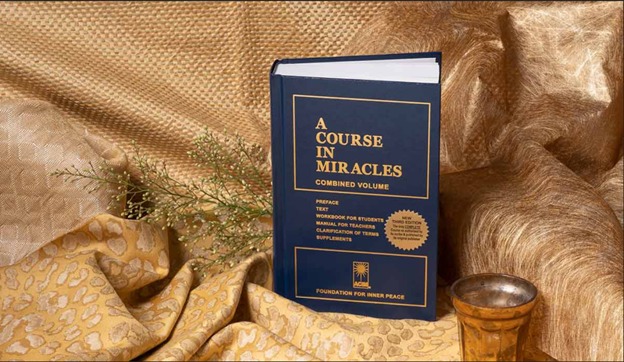 Real Blogger Outreach – Powerful Links. Zero Spam.
Real Blogger Outreach – Powerful Links. Zero Spam.
Exploring the Spiritual Themes in 'A Course in Miracles'
Written by course » Updated on: June 17th, 2025

'A Course in Miracles' (ACIM) is a profound spiritual text that has captivated readers and seekers of truth since its first publication in 1976. Authored by Helen Schucman, who claimed the content was dictated to her by an inner voice she identified as Jesus Christ, ACIM offers a unique perspective on spirituality, healing, and the nature of reality. The course has been embraced by those interested in spiritual growth, self-help, and the metaphysical understanding of life. This article delves into the key spiritual themes present in 'A Course in Miracles,' exploring how they contribute to a transformative spiritual journey.

1. The Concept of Forgiveness
Forgiveness is a central theme in 'A Course in Miracles,' but it differs significantly from the conventional understanding of the term. In ACIM, forgiveness is not about pardoning someone for their wrongdoings but about recognizing that the perceived wrong never truly occurred. The Course teaches that what we see as offenses are merely projections of our own fears and guilt. True forgiveness, therefore, is the release of these illusions and the recognition of the inherent innocence of all beings.
This spiritual practice of forgiveness leads to inner peace and the dissolution of the ego, which is seen as the source of all conflict. By forgiving others, we essentially forgive ourselves, recognizing that we are all interconnected and that our separateness is an illusion.
2. The Illusion of the Ego
ACIM presents the ego as a false identity, a construct that keeps us trapped in a cycle of fear, guilt, and separation. The ego thrives on conflict and the perception of scarcity, constantly reinforcing the idea that we are separate from God and from each other. This illusion of separateness is what the Course refers to as "the dream of the world."
The spiritual journey in ACIM involves awakening from this dream and recognizing our true identity as part of the Divine. The Course teaches that the ego is a barrier to this awakening and that by learning to see beyond the ego, we can experience the peace and love that are our true nature.
3. The Role of the Holy Spirit
In 'A Course in Miracles,' the Holy Spirit is portrayed as the bridge between our human experience and the Divine. The Holy Spirit acts as a guide, helping us navigate the illusions of the ego and leading us toward spiritual awakening. According to the Course, the Holy Spirit's voice is always accessible, offering guidance and wisdom to help us make decisions that align with our true nature.
The Holy Spirit is also described as the agent of healing. When we bring our fears, guilt, and grievances to the Holy Spirit, they are transformed into opportunities for growth and love. This healing process is integral to the Course's teachings, as it allows us to move beyond the ego and experience the joy and peace that come from living in alignment with our true selves.
4. The Concept of Reality and Perception
ACIM teaches that what we perceive as reality is actually a projection of our mind. This concept aligns with many spiritual traditions that view the material world as an illusion, or maya. According to the Course, our perceptions are distorted by the ego, which causes us to see a world of separation, conflict, and fear.
The Course encourages us to shift our perception by choosing to see the world through the eyes of love rather than fear. This shift in perception is referred to as a "miracle." Miracles are not supernatural events but changes in how we see and experience the world. By choosing love over fear, we align ourselves with the truth of our being and can experience the world as a reflection of divine love.
5. The Journey to Inner Peace
Inner peace is one of the ultimate goals of 'A Course in Miracles.' The Course teaches that peace is our natural state and that it can be experienced when we let go of the ego and its illusions. This peace is not dependent on external circumstances but arises from within, as we align ourselves with the truth of our being.
The journey to inner peace involves a process of unlearning the false beliefs and perceptions that the ego has instilled in us. It requires a commitment to forgiveness, to seeing beyond the illusions of the world, and to trusting in the guidance of the Holy Spirit. As we progress on this journey, we begin to experience a deep sense of peace and joy that is not affected by the ups and downs of life.
6. The Nature of Love
Love is a central theme in 'A Course in Miracles,' described as the essence of our being and the source of all true healing. According to the Course, love is the only reality, and everything else is an illusion. The ego, with its focus on fear and separation, obscures our awareness of love, but it does not change the fact that love is our true nature.
The Course teaches that love is unconditional and not dependent on external factors. It is not something we need to seek outside of ourselves, but something we need to uncover within. As we let go of the ego's illusions and embrace our true nature, we naturally become more loving, both toward ourselves and others.
7. The Illusion of Death
'A Course in Miracles' presents death as the ultimate illusion, a concept created by the ego to instill fear and reinforce the idea of separation from God. According to the Course, we are eternal beings, and what we perceive as death is merely a transition, not an end. The fear of death is seen as a major obstacle to spiritual awakening, as it keeps us focused on the material world and disconnected from our true spiritual nature.
The Course teaches that by recognizing the illusion of death, we can transcend our fear and experience the peace that comes from knowing that we are eternal and unchanging. This recognition is part of the larger process of awakening from the dream of the ego and returning to our true identity as part of the Divine.
8. Healing and Miracles
Healing is a recurrent theme in ACIM, closely linked with the concept of miracles. Healing, in the context of the Course, is the restoration of our awareness of the truth of our being. It is not merely physical healing but the healing of the mind, which involves releasing the ego's false beliefs and aligning with the truth of love.
Miracles, according to the Course, are expressions of love that result from this healing process. They are not extraordinary events but natural outcomes of choosing love over fear. Every act of forgiveness, every shift in perception from fear to love, is considered a miracle. These miracles are the means by which we heal ourselves and others, and by which we ultimately awaken to our true nature.

Conclusion
'A Course in Miracles' offers a profound and transformative spiritual path, one that challenges our conventional understanding of reality, forgiveness, love, and healing. By exploring and applying the spiritual themes in ACIM, individuals can embark on a journey of inner transformation, leading to peace, joy, and a deeper connection with the Divine.
FAQs
1. What is 'A Course in Miracles'?
'A Course in Miracles' is a spiritual text that offers a unique approach to spirituality, emphasizing forgiveness, the illusion of the ego, and the nature of true reality. It was authored by Helen Schucman and is based on her inner experiences.
2. How does ACIM define forgiveness?
In ACIM, forgiveness is not about excusing others' wrongdoings but about recognizing that the perceived wrongs are illusions created by the ego. True forgiveness involves letting go of these illusions and seeing the inherent innocence in everyone.
3. What is the role of the Holy Spirit in ACIM?
The Holy Spirit acts as a guide and a healer in ACIM, helping individuals navigate the illusions of the ego and leading them toward spiritual awakening.
4. What are miracles according to ACIM?
Miracles in ACIM are shifts in perception from fear to love. They are not supernatural events but natural expressions of love that arise from healing the mind.
5. How does ACIM view the concept of death?
ACIM views death as an illusion created by the ego to instill fear. The Course teaches that we are eternal beings and that death is merely a transition, not an end.
Note: IndiBlogHub features both user-submitted and editorial content. We do not verify third-party contributions. Read our Disclaimer and Privacy Policyfor details.
Copyright © 2019-2025 IndiBlogHub.com. All rights reserved. Hosted on DigitalOcean for fast, reliable performance.












